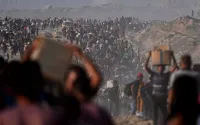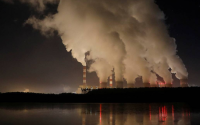12 May 2007Walter Pincus
Director of National Intelligence Mike McConnell believes it is "appropriate" for global climate change to be considered in a future National Intelligence Estimate, according to a letter he sent Wednesday to Rep. Anna G. Eshoo (D-Calif.), a member of the House Permanent Select Committee on Intelligence.
The letter arrived yesterday, one day after senior Republicans on the House intelligence panel criticized a provision in the fiscal 2008 intelligence authorization bill, co-authored by Eshoo, that requires the production of an NIE dealing with the impact climate change would have on U.S. national security.
After a vigorous exchange late Thursday night, the House voted 230 to 185 to defeat a motion to remove the provision from the bill. The motion was offered by Rep. Peter Hoekstra (R-Mich.), ranking minority member and former committee chairman.
In the letter, made available to The Washington Post by Eshoo's office, McConnell wrote, "I believe it is entirely appropriate for the National Intelligence Council (NIC) to prepare an assessment on the geopolitical and security implications of global climate change." The NIC supervises national intelligence estimates.
McConnell specified, however, that he hoped the legislation would "direct" other government agencies more familiar with climate change -- such as the National Academy of Sciences and the national laboratories -- to work with NIC analysts.
Hoekstra and his Republican colleagues were vehement in their opposition, stating that the measure would divert valuable intelligence analysts and case officers from working on the terrorist threat and the wars in Iraq and Afghanistan.
In an op-ed article in Thursday's Wall Street Journal, Hoekstra wrote that in the 1990s, intelligence satellites were diverted to photograph "ecologically sensitive" sites because of then-Vice President Al Gore's interest in environmental issues. Hoekstra said former CIA directorGeorge J. Tenet in his new book, "At the Center of the Storm: My Years at the CIA," had referred to this as "bugs and bunnies."
Tenet did use that phrase in his book but went on to endorse Gore's efforts. "Those kind of issues can have a profound effect on population flow, migration, civil wars, ethnic strife and the like," Tenet wrote.
Hoekstra, however, speculated that "intelligence clues in the run-up to 9/11 were missed" because spy satellites were "focused on the polar ice caps and schools of fish."
The White House also opposed an NIE on climate change, but based its objection on it being mandated by law and thus setting "a harmful precedent." It said the production of such intelligence reports should be done through dialogue between the executive and legislative branches.
In other amendments added to the intelligence bill late Thursday night, the House approved an amendment by Rep. Rush D. Holt (D-N.J.), chairman of the oversight subcommittee of the intelligence panel, to review and possibly update the Covert Agent Identity Protection Act, which sets penalties for disclosure of the names of CIA employees working undercover. The act was at the center of the recent I. Lewis "Scooter" Libby case.
The House also capped the size of McConnell's office at its level on May 1, 2007, thereby blocking staff increases contained in the fiscal 2008 bill.
http://www.washingtonpost.com/wp-dyn/content/article/2007/05/11/AR2007051102375.html






